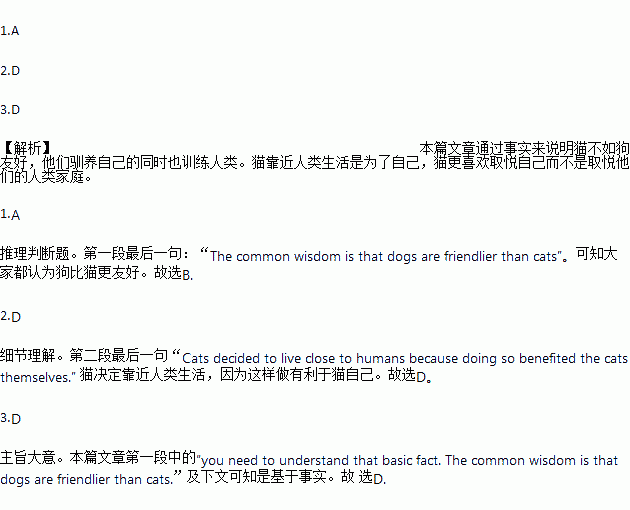题目内容
If you have a cat, you already know that a cat isn’t a dog that doesn’t have to be walked. If you’re about to bring a cat into your family, you need to understand that basic fact. The common wisdom is that dogs are friendlier than casts.
In recent years, scientists who have done DNA studies have offered a better way to understand cats. Unlike other animals that people feed, cats domesticated themselves, and, in a way, trained humans. Cats decided to live close to humans because doing so benefited the casts themselves.
Studies show that cats have lived with humans for about 12,000 years, since people first settled down and started farming. When people started storing grain, mice arrived and started eating the grain. Clever cats figured out that mice settlements where people stored grain were easy for hunting, so they started hanging around. Cats did what they needed to do to get the people to let them stay, but they kept up their independence. Over time, cats allowed humans to get a bit closer to them. Later, the farmers did befriend the cats. Certainly, it didn’t do them any harm because they could see the cats were really helping them out by eating mice.
Today, about a third of American families have cats. In most of those homes, the cats are still more interested in pleasing themselves than in pleasing their human families. A dog may do anything it can to make you happy, but kitty will teach you to make kitty happy.
1.Compared with dogs, cats are______.
A. colder B. friendlier
C. more warm-hearted D. more frightening
2.According to the text, why do cats decide to stay close to humans?
A. To be useful to themselves B. To protect grain from mice
C. To rely on humans for food D. To keep up their independence
3.What may be the best title for the text?
A. A common point between dogs and cats
B. The reasons why people like dogs
C. A disadvantage of raising cats
D. The basic fact about cats.
 第1卷单元月考期中期末系列答案
第1卷单元月考期中期末系列答案
